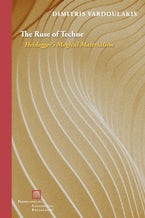Exordium xiii
Preamble: The Ineffectual and the Instrumental 1
1. The ineffectual 1
2. The instrumental 4
1 Introduction: What is the Ruse of Techne? 10
3. The ruse of techne 10
4. Metaphysical materialism (the metaphysics of morals) 14
5. The reception of Heidegger and the ruse of techne 16
6. The repression of instrumentality 31
7. The underground current of a materialism of instrumentality 35
8. Effects of the ruse of techne (or, why the repression of instrumentality still matters today) 39
9. On method 42
2 The Problematic of Action Within a Single, Unified Being: Monism in Heidegger's Thought 44
10. Heidegger's other path 44
11. The first problem: How to be a different materialist? 47
12. The second problem: How is action possible within a monist ontology? 52
13. The third problem: Can monism provide qualitative distinctions between actions? 55
14. Two kinds of monist materialism 57
15. Two historical difficulties arising from Heidegger's solution to the problematic of action in monism 61
16. The double bind of the repression of instrumentality: Between the vacuous and the self-contradictory 66
17. Why Heidegger's solution to the problematic of action in monism matters 72
3 The Conflation of Causality and Instrumentality: Phronesis and the Genesis of the Ruse of Techne 76
18. Heidegger's bildungsroman 76
19. The truth of phronesis as the combination of calculation, emotion, and situatedness 79
20. The two ends of action in Aristotle (Nicomachean Ethics 1139a32) 82
21. Techne and phronesis distinguished through their ends 86
22. The distinction between final and instrumental ends and the problematic of action in monism 90
23. A Greek-hating philhellene 91
24. The context of Heidegger's interpretation of phronesis 94
25. Heidegger's mistranslations of the hou heneka 98
26. Heidegger's discussion of hou heneka and heneka tinos: The repression of instrumentality 101
27. The genesis of the ruse of techne: sophia as the virtue of techne 105 ■
28. Teleocracy 112
29. Phronesis, resoluteness, and temporality: The "either/or" 115
Excursus: Through the Looking Glass of the Distinction Between Causality and Instrumentality 119
30. Acting and the other: The politics of instrumentality 119
31. The repression of instrumentality in metaphysics 126
32. Causal and instrumental ends in monist materialism 133
4 The Concealment of Instrumentality: The Conception of Action in Being and Time 144
33. The reason for focusing on the examples of action in Being and Time 144
34. The epigraph and the problem of action in the Sophist 146
35. Destruction and monism 149
36. Inauthentic, indifferent, and authentic action 151
37. Hammering and the concealing of instrumentality (Being and Time §15) 155
38. The breakdown of ends (Being and Time §16) 160
39. Sign and reference, understanding and interpretation (Being and Time §17) 164
40. Dictatorship 169
41. The temporality of death and the myth of Care 172
42. Techne as the virtue of theory 176
43. Subjectum absconditum 184
5 The Ontology of Conflict: Conjuring Authority 186
44. The "turn" and action 186
45. Authority as the means to repress instrumentality 189
46. Conflict and the three senses of techne 193
47. The subjectivism of authority (Prometheus) 196
48. The problem of the metaphysico-political conflict 202
49. The historical decision and phusis (Oedipus Rex) 204
50. Apolis and the spontaneous creation of authority (Antigone 1) 208
51. The human as deinon and the repression of instrumentality (Antigone 2) 213
52. A politics without reaction or an agonistic politics 219
53. The preservers and the magical founding of the city 222
6 The Ontology of the Ineffectual: The Purloined Letter of Instrumentality 229
54. The reversal of the critique of monism 229
55. The turn, the return, and the other turn (the critique of Sartre as self-critique) 234
56. Transformations of the ruse of techne 238
57. Instrumentality incorporated into causality (the first sense of techne) 239
58. The ambivalence of the calculable and enframing (the second sense of techne) 244
59. The killing power of the saving power (the third sense of techne) 248
60. Metaphysical or materialist monism? 252
61. The French appropriation of the repression of instrumentality 256
62. The new Kantianism 260
63. Technophobia and the repression of instrumentality 263
64. The paradox of the final end 266
Peroratio 272
Acknowledgments 279
Works by Martin Heidegger 283
Bibliography 287
Index 301

